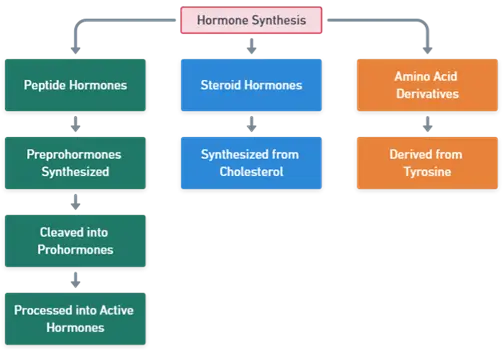- Basic Concepts in Endocrine Pharmacology: Involves receptor binding, feedback, and drug interactions.
- Basic Concepts in Endocrine Pharmacology is the Study of hormone action, synthesis, and regulation.
Endocrine System Overview
Definition:
- The endocrine system consists of glands that secrete hormones directly into the bloodstream to regulate various bodily functions such as metabolism, growth, reproduction, and stress responses.
Advertisements
Major Endocrine Glands:
- Pituitary, thyroid, parathyroid, adrenal glands, pancreas, gonads (testes/ovaries).
Hormone Synthesis and Secretion
Synthesis:
- Hormones are synthesized in specific endocrine cells. For example:
- Peptide hormones (e.g., insulin) are synthesized as preprohormones, cleaved into prohormones, and finally processed into active hormones.
- Steroid hormones (e.g., cortisol) are synthesized from cholesterol.
- Amino acid derivatives (e.g., thyroid hormones) are derived from tyrosine.
Advertisements
Secretion:
- Typically regulated by feedback loops (negative or positive). Example: Hypothalamic-pituitary-end organ axis.
Mechanisms of Hormone Action
- Cell Surface Receptors: Peptide hormones bind to membrane receptors, triggering second messenger pathways (e.g., cAMP, IP3/DAG).
- Intracellular Receptors: Steroid and thyroid hormones diffuse into cells to bind cytoplasmic or nuclear receptors, altering gene transcription.
Advertisements
Principles of Endocrine Drug Therapy
- Hormone Replacement: For deficiencies (e.g., insulin for diabetes).
- Hormone Inhibition: To reduce excess hormone levels (e.g., methimazole for hyperthyroidism).
- Receptor Modulation: Agonists or antagonists modulate receptor activity (e.g., selective estrogen receptor modulators).
Pharmacokinetics and Pharmacodynamics
Pharmacokinetics (PK):
- Involves the absorption, distribution, metabolism, and excretion (ADME) of endocrine drugs.
- For example, oral thyroid hormones are absorbed in the gastrointestinal tract and may require conversion in the liver.
Pharmacodynamics (PD):
- Relates to the drug’s mechanisms of action and its effects on the body.
- Endocrine drugs often act as hormone analogues or antagonists, binding to specific receptors to mimic or inhibit natural hormone actions.
Advertisements
Receptor Types, Agonists, and Antagonists
- Receptors: Intracellular (e.g., steroid) or membrane-bound (e.g., peptide).
- Agonists: Mimic hormones (e.g., levothyroxine for thyroid hormone replacement).
- Antagonists: Block hormones (e.g., somatostatin analogues inhibit GH).
Feedback Mechanisms and Homeostasis
- Feedback Mechanisms and Homeostasis Endocrine systems use primarily negative feedback to maintain balance.
- Drugs often restore or modulate feedback mechanisms (e.g., cortisol suppresses ACTH via negative feedback).
Therapeutic Uses and Side Effects
- Uses: Treat hypothyroidism, diabetes, adrenal insufficiency, and hormonal cancers.
- Side Effects: Systemic effects like osteoporosis (corticosteroids) or hypoglycemia (insulin).
Advertisements


